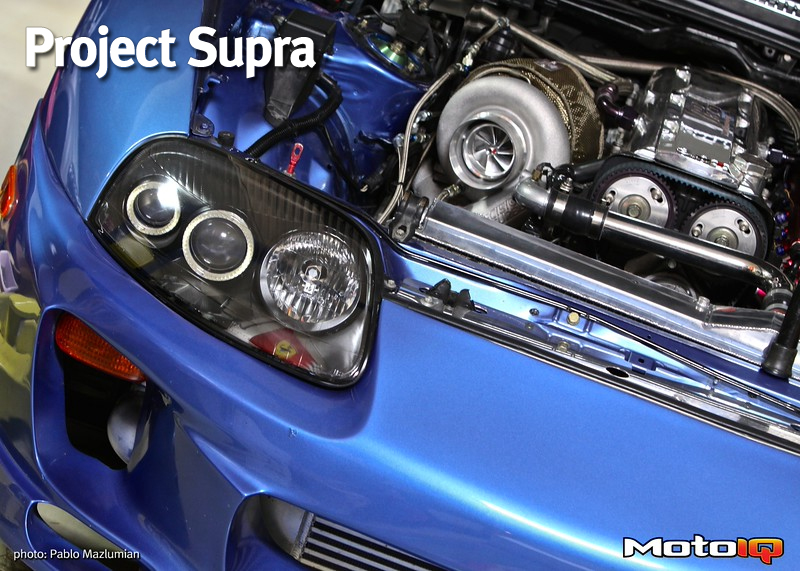
We're trying out the GEN2 PT6870 CEA turbocharger from Precision Turbo and Engine next!
Project Supra: Part 14 – Precision Turbo 6870 Turbocharger
Since the weather hasn’t allowed much for good, Supra fun here in the Midwest, we’ve been rather quiet with the blue car over the last few months.

This is what the Supra's looked like since November–just excited to get out is all!
Recently, the weather has started to break, so we’re totally excited to put the car through its paces via a GEN2 PT6870 CEA turbocharger from Precison Turbo and Engine! But before we go into that, let’s first review some history of the little-Toyota-that-could.

I acquired the Supra from a friend in 2003. For the first 85,000 miles of its life with its previous owner, this Supra ran bone stock with the factory twin turbos making about 280 WHP.
Over the course of a year, some bolt-on upgrades were added and the car made it to just shy of 400 WHP at 17 PSI in 2004. By now it was using an AEM EMS (Series 1), a bubbled intake manifold, a 3-in thick Turbonetics/Spearco front-mount intercooler, AEM cam gears and intake system, and a 3-in exhaust comprised of a Stillen 3-in downpipe and 3-in thermal exhaust.
It should be noted that cylinder #4 was down to around 90 PSI at the time (which is how the car was purchased). Because of this, I’d decided to have the 2JZ-GTE engine rebuilt using stock compression JE Pistons and Pauter connecting rods. The car was also converted to a single turbo, using a PT71-GTQ turbo kit from Sound Performance, which at that time was still sold with a 3-in diameter downpipe. Using HKS 272 cams and 1000cc injectors, and a full Ferrea valvetrain with 1-mm oversized valves, we were on our way up to pretty good power when the dreaded crank walk took care of our main bearings, and eventually seized the motor.
Struggling for funds at the time, I’d enlisted the use of a stock short block from AutoNation Toyota Scion. You can still pick a short block from there for just $2,600. Since the seized motor also meant a seized turbo (due to the lack of oil pressure), that setup—using the aforementioned upgrades—was good for 600 WHP on 93 octane and 760 WHP using a single-nozzle AEM methanol injection system at the charge pipe, as well as what was now a 3.5-in exhaust fabricated by Modified by KC—the outfit which also tuned the car, and does so to this day.
Up until then (we’re to about 2008 now), I’d been documenting all of these upgrades in Turbo and Hi-Tech Performance Magazine. Unfortunately, the magazine was disconinuted (along with several other Source Interlink rags), so I documented the latest tune and RPS twin-disc clutch install for Modified Magazine in a one-off article.
The car ran great for several years until multiple fifth-gear passes one day caused cylinder #1 to eventually melt down at the piston. The culprit was determined to be not insufficient methanol reaching cylinder #1, due to the sudden bend of the factory lower intake runner. Therefore, the ignition timing was too high in that cylinder, given the available octane. The rest of the cylinders, which were getting methanol, were perfect, but they also had a much straighter shot through the factory intake runners into the intake valves. This is where we picked up the project in MotoIQ in 2012.
We got another engine built with JE Pistons’ asymmetrical pistons, K1 rods, Titan 272 cams, a new Ferrea valvetrain, a 4-in thick intercooler setup from ETS, Fluidampr crank pulley, Hypertune intake manifold, PHR S43 exhaust manifold, and the same 3.5-in exhaust setup from MKC. Since we were now using AEM’s Infinity stand-alone engine management system, we also converted the car to E85 fuel using FIC 2250cc injectors, dual Walbro 485 fuel pumps, and an assortment of Aeromotive fuel products to complete the fuel system. None other than the popular PT6766 CEA Precision Turbo dual ball bearing turbocharger powered the car—this was a setup which provided excellent spool up and was good for over 800 WHP at 29 PSI.
We absolutely loved the PT6766 CEA until now but today there’s another bad boy on the Precison turbo block—the GEN2 PT6870 CEA—and we’re trying it out! Let’s take a look at the turbo now.

When the box arrived, it was exciting times. Having used several Precision turbos in the past, I was impressed this time with its new packaging



